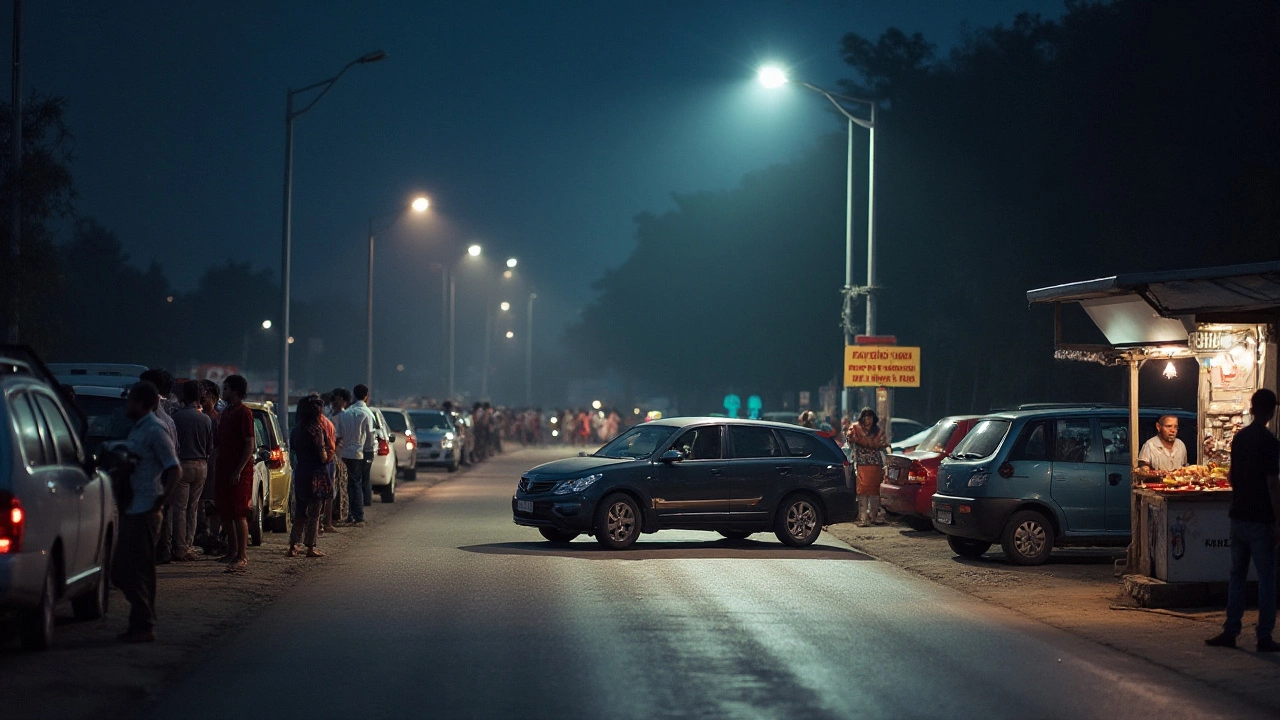In moments of necessity or even an adventurous spirit for road trippers, sleeping in a car can become a reality. It's crucial to know the right spots to do so, keeping safety and comfort in mind. While not the conventional choice, parking your car for a night's sleep demands some understanding of the environment and legal context.
From legal considerations that vary by location to safety tips that ensure a peaceful slumber, this guide attempts to navigate these often maze-like paths. It delves into the subtle art of blending comfort with practicality and explores options beyond the confines of the car. Preparing for a night in your vehicle means packing the right essentials and recognizing spaces that offer not just a place to park, but a secure shelter for the night.
- Legal Considerations
- Safety Tips
- Comfort Essentials
- Finding Community Resources
- Alternatives to Car Sleeping
Legal Considerations
Embarking on sleeping in your car can open a Pandora's box of legalities that vary widely depending on where you find yourself. The laws governing this practice are not universal, and thus it's essential to acquaint yourself with the local statutes concerning parking and vehicle habitation. Many cities have ordinances against sleeping in vehicles within city limits, mainly to manage urban aesthetics and safety concerns, and sometimes due to pressure from residents who regard such practices as unsightly or indicative of societal issues. Understanding these regulations can save you from unwanted encounters with law enforcement, who have the authority to enforce these rules, often resulting in fines or, in more extreme situations, towing. Researching municipal codes online or at local city halls can provide clarity on where overnight car parking is permitted. There may even be differences within different areas of the same city or town, so it pays to be informed.
One key tip is to look for designated overnight parking areas. Public rest stops, which are often located along highways, can provide a temporary refuge for weary travelers needing rest, and usually, these are not patrolled with the same scrutiny as city streets. Still, even these areas can have time limits enforced, so checking posted signs is crucial. Interestingly, some progressive cities have begun piloting safe parking programs which allow individuals living in their cars to park overnight legally, often providing basic amenities like restrooms or security. These programs can be an essential lifeline, offering both safety and legality in spaces that might otherwise be fraught with challenges. An interesting example is Los Angeles, where the Safe Parking Program has been offering designated parking lots to those needing a place to stay without fear of legal issues.
For a more hands-on approach, consider reaching out to local advocacy groups and nonprofits that specialize in homelessness or transient living. These organizations often have the latest news on where safe parking is available and can provide valuable resources or aid if you're in a difficult spot. They can also sometimes offer legal advice or direct you to affordable legal services if you run into issues. Ignorance of the law doesn't typically offer a defense, so equipping yourself with knowledge beforehand is vital. As a shared human experience, it's important to advocate for policies that extend compassion and support to those using their vehicles as temporary homes. In the words of Tony Zinnanti, a well-known attorney focusing on housing rights,
"It's not just about enforcement, but also understanding why individuals are in this position and offering meaningful support over penalties."
With legislation constantly evolving, keeping abreast of changes in local laws affecting car dwellers is prudent. A robust knowledge of car sleeping spots and the respective laws can make a world of difference when you're reliant on your vehicle as your haven. Websites like local government pages often list updated ordinances, but also monitoring community forums or social media groups dedicated to van lifers and car campers can provide insights which aren’t available in formal publications. Having a basic legal toolkit ready can ease some of the tensions that arise from sleeping in your car, enabling you to focus on other aspects, like ensuring comfort and safety during your stay.
Safety Tips
When you're settling in for the night in your vehicle, the need for safety cannot be overstated. The provisions for a safe sleep zone begin with the choice of location. Look for areas that are well-lit and heavily populated, like those adjacent to 24-hour grocery stores or hospitals. These spots are bustling with activity, reducing the likelihood of unwelcome disturbances. It might sound obvious, but always lock your car doors as soon as you're inside. In terms of legal aspects, different cities have different ordinances, so it's crucial to understand the laws in that area to avoid fines or unpleasant interactions with local authorities.
Besides choosing the right environment, awareness of your surroundings is paramount. Keep windows slightly cracked to prevent condensation and ensure you're able to hear what's going on outside. However, leaving them rolled down too low might invite unwanted guests, both human and insect. A small privacy window cover or curtain can work wonders in maintaining a sense of security and obscurity. Consider investing in a basic car alarm if your vehicle doesn't have one installed; the piercing sound can deter most would-be intruders. Additionally, trust your gut—if something feels off about a place, move on. Your instincts are often reliable indicators when it comes to personal safety.
"Safety isn't expensive, it's priceless." — Unknown A timeless quote that underscores the value of taking precautions.
Another significant tip is to maintain a low profile. Drawing attention to yourself or your vehicle isn't ideal when you're aiming for a restful sleep. Avoid using bright interior lights that could make your car stand out like a spotlight on an otherwise darkened street. Keep electronics and other valuables out of sight, as belongings visible through the window can attract the wrong kind of attention. Parking nose-out also makes a quick exit easier if necessary. Some urban adventurers prefer the false security of secluded areas, but quiet spots can become lonely and unsafe at night, so weigh your options carefully.
Finally, maintaining good relations with the community adds an extra layer of security. Establishing a network or recognizing familiar faces where you typically park can help, as locals might offer valuable advice on safe locations or come to your aid in times of need. If you're often in one area, supporting local businesses by purchasing items like coffee or breakfast in exchange for a safe parking spot can also be a worthwhile strategy. Of course, these interactions should remain respectful and considerate, understanding that not everyone may be welcoming of people living out of their cars.
Safety, though occasionally overlooked, acts as the backbone of finding your best car sleeping spots. By embedding these tips into your nightly routine, you'll not only foster a sense of security but will also contribute to local harmony, making your experience less stressful and more pleasant. It's a synergy of awareness, preparation, and respect toward both yourself and your temporary neighborhood.

Comfort Essentials
When the car becomes a temporary home, achieving a good level of comfort inside your vehicle is paramount. It's surprising how small adjustments can greatly transform the sleeping experience. Start by considering the layout of your car. Ideally, your back seats should be able to fold down completely to provide a flat surface to stretch out. If not, it's prudent to think about bringing along an inflatable mattress specifically designed for cars, which can fit snugly in the backseat or the trunk area. This creates a semblance of a real bed, which can significantly enhance restfulness.
Beyond just the layout, consider the temperature control inside your vehicle. Between hot summer nights and cold winter evenings, maintaining a manageable climate can make all the difference. If chilly air is a concern, thermal blankets and sleeping bags rated for low temperatures are indispensable. Conversely, reflective sunshades can help keep the car from overheating in warm weather. Ventilation is often overlooked, but cracked windows can maintain airflow without compromising privacy or security. Be sure to have window screens to prevent unwelcome insect visits.
For a cozy interior, think about using seat cushions or pads for extra softness where needed. Every little touch adds up to greater comfort. Continuing with this notion, having a few homely items like a small pillow or a favorite throw can bring a sense of normalcy. You may want to have a kit with essentials like wet wipes, deodorant, and toothbrush for maintaining personal hygiene easily. In the sphere of living out of a car, decluttering is vital. Keep your belongings organized; packing cubes or storage bins are ideal for this purpose, ensuring everything has its place and is easy to reach when needed.
According to Jane Smith, a lifestyle columnist from The Simple Life magazine, "Creating comfort while sleeping in your car is about more than just a good night's rest. It's about reclaiming a bit of normalcy and control in an otherwise unique situation."
Lighting can also play a role in creating a restful atmosphere. Small touch lights or battery-operated lamps are useful for reading or maintaining visibility without draining your car battery. As you cannot alter the outside environment dramatically, controlling the light inside can feel empowering and practical. Alongside lighting, a source of entertainment like a good book or a downloaded series on a device can ease the transition from activity to relaxation.
Organization is key as well. Consider the gear you keep in your car, like blankets and flashlights, and how it's stored. Make it as accessible as possible. Items like hooks and nets can help create extra storage space, allowing you to hang clothes or keep food supplies conveniently at hand. Attention to how efficiently space is utilized helps not just in terms of comfort but also in psychological ease—there's less stress when everything feels in order and easily accessible.
Finding Community Resources
When sleeping in your car becomes a necessity, whether due to transitional circumstances or lifestyle choices, tapping into community resources can make a significant difference in your experience. Across many towns and cities, there are networks devoted to assisting those who live out of their vehicles. These resources range from simple things like places where you can park legally overnight to more comprehensive support services that address broader needs. One of the key aspects to consider is safety, as finding an environment where you feel secure can greatly influence your overall well-being.
Many communities now have designated safe parking programs. These initiatives, often backed by local councils or non-profit organizations, provide monitored parking spots specifically for individuals sleeping in their cars. This not only helps ensure safety but also offers amenities such as restrooms or food services. Take, for example, the Safe Parking LA initiative in Los Angeles, which provides secure overnight parking, as well as access to social-firm services to help improve attendees' circumstances over time.
"The need for safe places to park overnight grows as housing costs rise. Coordinated community efforts are crucial," said Marie Clark, Director of Local Outreach Services.In addition to official programs, many churches open their parking lots to car campers, offering both spiritual and practical support. The love thy neighbor ethos fuels this outreach, allowing people not just a place to rest but a sense of community.
Aside from dedicated parking, numerous charities offer resources such as food pantries and mobile shower units. These are essential components, especially when living in a vehicle. Organizations like Feeding America provide access to food banks across the country, ensuring that those in need have access to nutritious meals. Be it a hot meal or a packet of essentials, these services can lighten the load considerably. Moreover, mobile shower services such as Lava Mae in San Francisco can play a vital role in maintaining personal hygiene.
For more tech-savvy individuals, online platforms and social media groups have emerged as invaluable tools. Websites like Couchsurfing and Facebook groups can connect individuals with locals willing to offer temporary parking or a warm shower. It can act as a bridge to finding not only practical solutions but also fostering real-world connections and support networks. Social interactions can sometimes provide a shimmer of hope and reduce the isolation one might feel while living from an automobile.
Finally, local libraries can be a surprising yet invaluable resource. Many offer not just refuge from extreme weather but also access to the internet, essential for finding information or job searching. Some libraries even run homeless outreach initiatives or provide workshops aimed at improving employment prospects.

Alternatives to Car Sleeping
If you're pondering over the idea of sleeping in your car, it's worth exploring alternatives that might offer more comfort and safety. While the shelter of your vehicle can be a handy option in certain situations, especially for those who are traveling or facing temporary homelessness, other resources might provide a better living and sleeping environment. Understanding these options is essential, particularly when parking lots or rest areas might not suffice for a restful night's sleep. Remember, stepping beyond the solitude of your car can enable access to necessary facilities and a supportive community network. It's important to see what else is available before settling into your car seat for the night.
One key alternative is seeking out homeless shelters, which are designed as safe havens for those without a fixed address. These facilities offer more than just a bed; they provide meals, showers, and sometimes even services like counseling, job training, and medical aid. However, availability can sometimes be limited, and they might operate on a first-come, first-served basis. If you're in need and nearby one, it might be worth checking their schedules or simply reaching out when possible.
Beyond shelters, there are other resources like community centers or religious institutions, which sometimes extend their support in the form of overnight hospitality. Churches, temples, and other places of worship can often have programs to assist individuals in their time of need. If you're lucky, you might find one willing to offer warm meals and a safe place to sleep. This can be a refreshing change from the isolation of car sleeping, providing a more human connection and sense of community.
In addition to shelters and community support, consider looking into low-cost accommodation options, like hostels. They might be especially feasible for road trippers needing a break from car sleeping. Hostels offer dormitory-style living at a fraction of the cost of motels and provide shared facilities that can make your stay more comfortable. Not to mention, many hostels host a vibrant community atmosphere where you can meet fellow travelers, which is a perk that car sleeping doesn't offer.
As you explore alternatives, you might find temporary job opportunities that provide housing access in exchange for work. Work-for-stay arrangements are common in some rural areas, particularly during harvest seasons. These opportunities allow you to earn a living while securing basic accommodations—an advantageous situation if you're seeking a stable place to rest your head without spending the night in your car. Remember, each option presents its own set of challenges, but they are worth considering and can open doors to more stable living conditions, breaking away from the cycle of continuous car dwelling.
Finally, don't overlook online communities and forums where individuals share advice and experiences about living in vehicles. These platforms can be a valuable resource for tips, from learning about locations where car camping is welcome, to connecting with others who have gone through similar experiences. They also offer a space to discover more unconventional alternatives that perhaps weren't on your radar yet.





